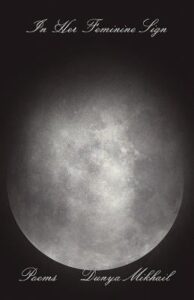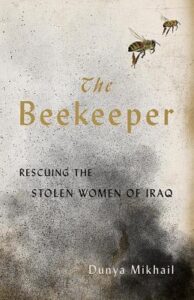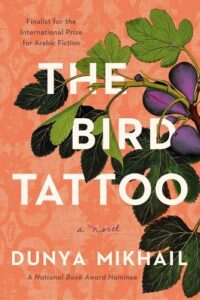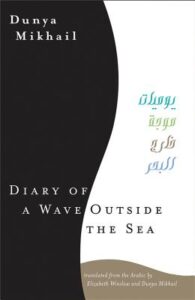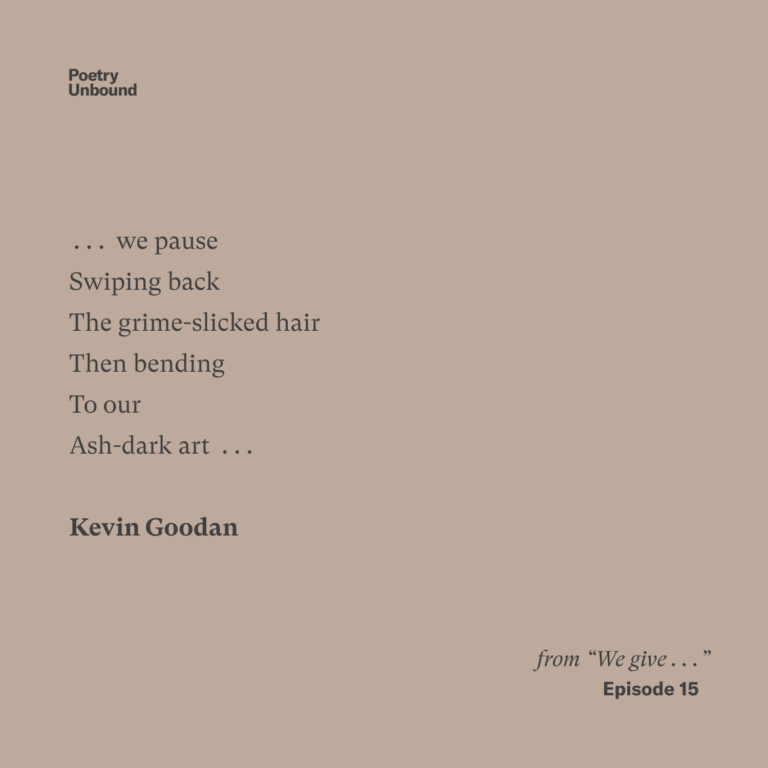Dunya Mikhail
Eva Whose Shadow Is a Swan
Some friendships are built on small encounters and last a lifetime. Two women — from across culture, location, and age — spend a lifetime in communication.
We’re pleased to offer Dunya Mikhail’s poem, and invite you to connect with Poetry Unbound throughout this season.
Pre-order the forthcoming book Poetry Unbound: 50 Poems to Open Your World and join us in our new conversational space on Substack.
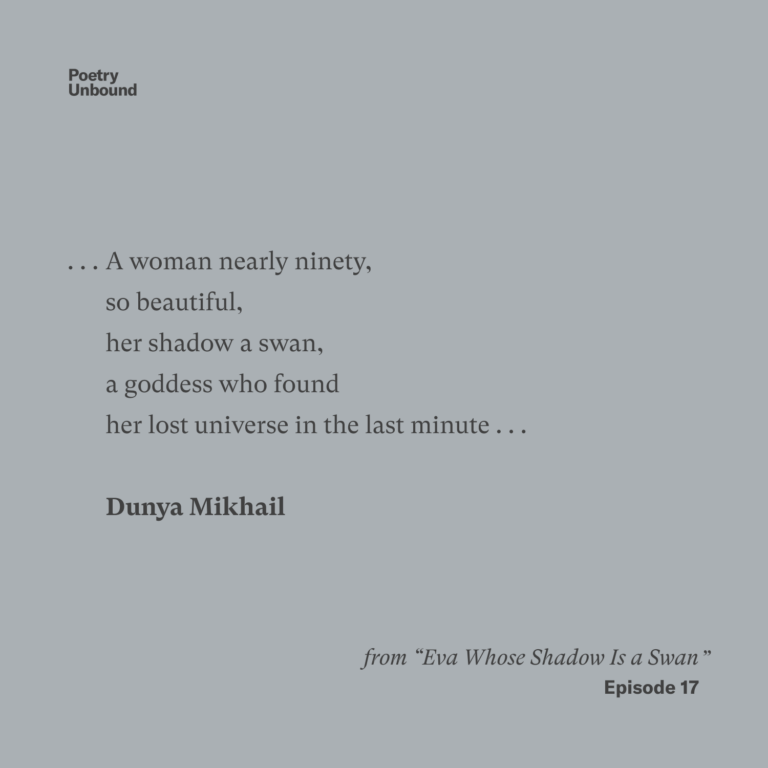
Guest
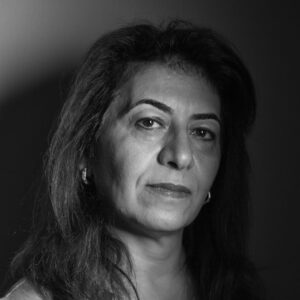
Dunya Mikhail is an Iraqi-American poet and writer. She is the author of Diary of a Wave Outside the Sea (New Directions Publishing Corporation 2009), The Iraqi Nights (New Directions Publishing Corporation 2014), The Beekeeper (New Directions Publishing Corporation 2018), In Her Feminine Sign (New Directions Publishing Corporation 2019), and The Bird Tattoo (forthcoming from Pegasus Books 2022). She is a laureate of the UNESCO Sharja Prize for Arab Culture and has received fellowships from United States Artists, Guggenheim, and Kresge. Her honors also include the Arab American Book Award, and the UN Human Rights Award for Freedom of Writing. She currently works as a special lecturer of Arabic at Oakland University in Michigan.
Transcript
Pádraig Ó Tuama: My name is Pádraig Ó Tuama, and when I was 19 I was the cook on a camp for young people from all across Ireland. There was 200 young people. And one night what we cooked clearly wasn’t to their liking, most of them just dumped their food into a bin. Myself and another guy, total stranger to me, were assigned to take everything from the bin and to move it away. And it was disgusting, and it took us a couple of hours to empty these bins filled with slops of food. Well, me and that fellow became friends, and we’re still friends. I played the guitar at his wedding. And our friendship has lasted for so long. I keep on looking back to the humble beginnings of what has been a lovely lifelong friendship.
[music: “Praise the Rain” by Gautam Srikishan]
“Eva Whose Shadow Is a Swan” by Dunya Mikhail.
“The day we met in Babylon
for me to interpret her,
Eva found a pocket stone
she’d later add to her collection
of stones from different cities
she kept in a glass bowl.
“We strolled roadsides
piled with rocks blasted
from bridges and buildings
now bent and cratered,
yet I like to think that stone
might have predated the fall of Babylon,
when people spoke one language.
“I liked Eva’s musical tone.
She said, I am from Stockholm,
home to no war for two hundred years.
“I am from Baghdad, I replied,
a city we call the “home of peace,”
though war has lived in it
for two hundred years.
“We exchanged postcards
for thirty years before my East
and her West met in London,
our friendship needing
no umbrellas in the rain.
I waited for her impatiently
but hid on a whim behind a pillar,
admiring her poise
as she approached
and scanned the passersby,
like Noah in search of the Ark.
“A woman nearly ninety,
so beautiful,
her shadow a swan,
a goddess who found
her lost universe in the last minute.
“She hiked an island mountain
on the way to our meeting
and bought a CD
of ferry music for me.
“When I followed up
with a farewell call, I learned
she’d lost her hearing:
Write, so I can hear you.
“She must have read my lips—
the concert we attended
in the rain must have seemed
like lightning without thunder.
“When I receive her postcard,
I can’t read her handwriting
but plan to search the dictionary
of Babylon for her words
and decipher the line drawn by time.”
[music: “Daybreak” by Gautam Srikishan]
So this gorgeous poem is about a friendship, an unexpected friendship, that built on a chance encounter between two people at work, somebody visiting from Sweden, somebody local who’s the interpreter. And it’s a workplace that has dynamics in it. You know, someone who can leave, someone who’s local. Someone who can interpret, and someone who needs to be interpreted.
And into this comes that most transformative and unexpected thing: a friendship and a friendship that lasts decades. And it seems too, to me, a friendship that began really quickly, really easily. I keep on wondering every time I read this poem: what was it that prompted this friendship? Was it that Eva saw a stone? Or was it that they were strolling? That’s a lovely word to use in the second stanza. “We strolled roadsides / piled with blocks blasted / from bridges and buildings”.
You know, there’s so much explosion, literally, in the “blasted”, “bridges”, “buildings”, “bent”. But “strolled” is a really unexpected verb to use there. Was it the capacity that the two of them found themselves in an easy walk with each other that meant a friendship started? Or the musical tone of Eva’s language? Or what she said? Or some kind of intuitive connection that bonded them together into a friendship that lasted so long? Such intimacy, such care and love, really, between these two all begun on this day in Babylon, as she says it.
[music: “Daybreak” by Gautam Srikishan]
This poem, moving back and forth between referring to Babylon and Baghdad, builds on narratives that you find in Hebrew Bible and in Quran. And also in Rastafarianism. And also in pop culture, like The Matrix, in terms of referring to these great places. The Fall of Babylon is referred to early on in the poem. You know, the place where that great tower that had been– that was supposed to have reached up to heaven. And the story says that God scattered the people and confused their language. ‘Balal’ is the word in Hebrew for confusing the language. And then there’s a reference later on to “Noah in search of an Ark” when Eva is in London, looking around for Dunya as she’s hiding behind a pillar. Mythology, and religious narrative, and religious location, especially in terms of Baghdad, Babylon, underlines this entire poem so beautifully.
And there’s this reference to the beginning of the friendship between the poet and Eva. And then, after a couple of stanzas, we suddenly are into these words: “We exchanged postcards / for thirty years before my East / and her West…” Thirty years. It’s kind of extraordinary, that casual line. There’s evidence of such long affection, and evidence of such writing between these two people. And then time is picked up again a few stanzas later: “A woman nearly ninety”.
I love that it’s postcards that these two women exchange. You know, a postcard is something so simple. Somehow it’s a physical token of somebody saying: “I was thinking about you and I’ve taken time, and ink, and a stamp, and a postcard, and sent this to you.” It’s a small holder for something much bigger than the message it contains.
[music: “The House You Wake In” by Gautam Srikishan]
So much of this poem is about communication across barriers, whether that’s barriers of distance, barriers of languages that aren’t mutually comprehended. The word that Dunya Mikhail uses at the beginning is “The day we met in Babylon / for me to interpret her,” – “interpret”, not translate. Because it’s a way of saying: I’m not just taking one thing and putting it exactly into another language. It’s understanding the heart meaning of what’s being said in one language and rendering that in the heart language in another. And “interpret” here is a deep form of listening, something really powerful.
There’s a small other shift toward the end of the poem where the poet realizes that Eva’s lost her hearing and begins reflecting herself on what was being communicated. How did we communicate to each other? And she says she must have been lip reading. The interpretation that she’s been providing at the beginning of the poem has been modulated now, so that Dunya Mikahil, she’s having to be interpreted through the physicality of being in the same place. And each time that this happens in the poem, we’re being called into the question of: how do we interpret ourselves to each other and our closest friends back to us? Even in body language.
Later on in the poem, she says, “I waited for her impatiently, / but hid on a whim behind a pillar”. What’s the interpretation of that? Maybe the awkwardness of suddenly the immediacy happening between two people who have been corresponding by postcard for thirty years. But suddenly time is going to be collapsed and what’s said by one will be heard by the other, they think, although later on we find out that even there there’s still a space and a distance between the two.
In a way, these two women represent what Dunya Mikhail, I think, is proposing for what’s possible for a population. And she knows it well. She’s not saying that easily, like, “oh yeah, friendship is the balm to everything.” Interpretation and communication, and having to figure out space between language, space between two people, space where either your handwriting or the sound of your speech can’t be heard or received. Those things are happening over and over throughout this poem. But in the midst of that there’s something so gorgeous about the exchange here and that the love is shared and the friendship transforms each of them and sustains each of them. In many ways, all of the barriers are being seen to be penetrable, because love is always able to make its way through these things.
[music: “At Dusk” by Gautam Srikishan]
“Eva Whose Shadow Is a Swan” by Dunya Mikhail.
“The day we met in Babylon
for me to interpret her,
Eva found a pocket stone
she’d later add to her collection
of stones from different cities
she kept in a glass bowl.
“We strolled roadsides
piled with rocks blasted
from bridges and buildings
now bent and cratered,
yet I like to think that stone
might have predated the fall of Babylon,
when people spoke one language.
“I liked Eva’s musical tone.
She said, I am from Stockholm,
home to no war for two hundred years.
“I am from Baghdad, I replied,
a city we call the “home of peace,”
though war has lived in it
for two hundred years.
“We exchanged postcards
for thirty years before my East
and her West met in London,
our friendship needing
no umbrellas in the rain.
I waited for her impatiently
but hid on a whim behind a pillar,
admiring her poise
as she approached
and scanned the passersby,
like Noah in search of the Ark.
“A woman nearly ninety,
so beautiful,
her shadow a swan,
a goddess who found
her lost universe in the last minute.
“She hiked an island mountain
on the way to our meeting
and bought a CD
of ferry music for me.
“When I followed up
with a farewell call, I learned
she’d lost her hearing:
Write, so I can hear you.
“She must have read my lips—
the concert we attended
in the rain must have seemed
like lightning without thunder.
“When I receive her postcard,
I can’t read her handwriting
but plan to search the dictionary
of Babylon for her words
and decipher the line drawn by time.”
[music: “Praise the Rain” by Gautam Srikishan]
Chris Heagle: “Eva Whose Shadow Is a Swan” comes from Dunya Mikhail’s book In Her Feminine Sign. Thank you to New Directions Publishing who gave us permission to use Dunya’s poem. Read it on our website at onbeing.org.
[music: “Praise the Rain” by Gautam Srikishan]
Poetry Unbound is: Gautam Srikishan, Eddie Gonzalez, Lilian Vo, Lucas Johnson, Amy Chatelaine, Kayla Edwards, and me, Chris Heagle.
Our music is composed and provided by Gautam Srikishan and Blue Dot Sessions.
This podcast is produced by On Being Studios, which is located on Dakota land. Open your world to poetry with us by subscribing to our Substack newsletter at poetryunbound.org. You may also enjoy our other podcast On Being with Krista Tippett, or our newsletter, The Pause. Visit us at onbeing.org to find out more.
Pádraig Ó Tuama: Friends, thanks very much for listening to Poetry Unbound, whether you’re new or you’ve listened to them all — your attention makes everything worthwhile. And I’ve got some news: I’ve written a book, Poetry Unbound: 50 Poems to Open Your World. There’s 50 poems, each with a fresh essay written by me. I’d love if you’d pre-order it, or pre-order a few, and join up to our free interactive newsletter. Links to everything at poetryunbound.org.
Books & Music
Recommended Reading
The On Being Project is an affiliate partner of Bookshop.org and Amazon.com. Any earnings we receive through these affiliate partnerships go into directly supporting The On Being Project.





